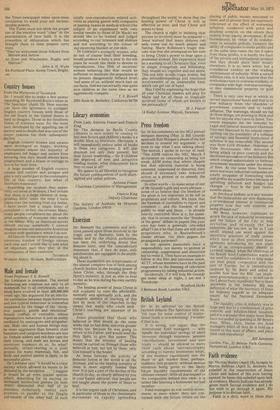British Leyland
Sir: In its editorial on the British Leyland debacle The Spectator tells us, 'the case for some control of institutional funds is overwhelming'. I wonder if that is so.
It is wrong, you argue, that the institutional fund managers — who handle the individual savings of small investors through insurance, pension contributions, investment and unit trusts — should be allowed to move their cash about 'uncontrollably according to current investment whim, at one moment capriciously into the share or gilt market then, perhaps, suddenly into property, without serious attention being given to the likely future liquidity requirements of the ultimate owners'. With all due respect to the compassion behind this view, it is rather like blaming a barometer for bad weather.
Fund managers do not switch investments at mere whim: they are concerned with the future return on the placing of public money entrusted to them, and at present they are supremely concerned at the effect of worsening' inflation, combined with price and dividend controls on the return they receive from equity investment. If the Government, by virtue of its commitment to socialist policies, hampers the ability of companies to make profits and at the sarne time raises the tax it takes from those profits, it is hardly the fault of the private and institutional investor that they should place their money elsewhere. It is no mere whim, but a considered verdict on the trading environment of industry. With a record inflation rate, is it any surprise that the institutions turn to overseas markets, or companies with high overseas earnings, or into commercial property or gold shares?
• There is only one way in which to attract institutional funds and that is to free industry from the shackles of government controls and to tackle inflation. The warnings, should we fail do these things, are pouring in thick and fast for anyone who cares to listen. Two recent examples are the remarks by Legal and General Assurance chairman Viscount Harcourt in his annual report spelling out the possibility of a collapse of savings and financial institutions if inflation is not controlled. The second was from Lord Plowden. chairman of Tube Investments, who delivered a biting attack en price controls and the disclosure provisions of the Industry Bill which compel industrialists to forecast investment intentions under the threat of fines. At the same time, however, more and more industrial companies are totally incapable of forecasting sales and profits six months hence because of spiralling inflation and budget tax changes — four in the past twelve months alone.
In this fiscal bedlam, is it any wonder that the institutions are now displaying a re-awakened interest in commercial property now that rent controls are being phased out?
Mr Benn, however, continues to attack the lack of industrial investment and the failure of the City to help revitalise and re-equip the key industries. He has not, as far as I can recall, uttered one word against the restrictive practices of trade unions which have so often prevented managements introducing the new plant that is so conspicuously absent at Leyland; indeed, when the chairman of the British Steel Corportaiton warns of the need for redundancies to help make our steel prices competitive with the rest of Europe, he is immediately carpeted by Mr Benn and asked to ponder how best the BSC can implement government policy — as laid out in the Labour Party manifesto! Nor is there anywhere in the Industry Bill any definition of what the Secretary of State for Industry regards as 'an adequate return' for the National Enterprise Board.
The liquidity crisis in industry was in large part due to a combination of price controls and inflation-blind taxation, and it is a wonder that many more firms have not ended up queuing at Mr Benn's door. Whey, then, blame the fund managers when all they do is hold up a mirror to this state of affairs, and place their cash elsewhere?
Bill Jamieson Garden Flat, 22 Belsize Park Gardens, Hampstead, London NW3










































 Previous page
Previous page